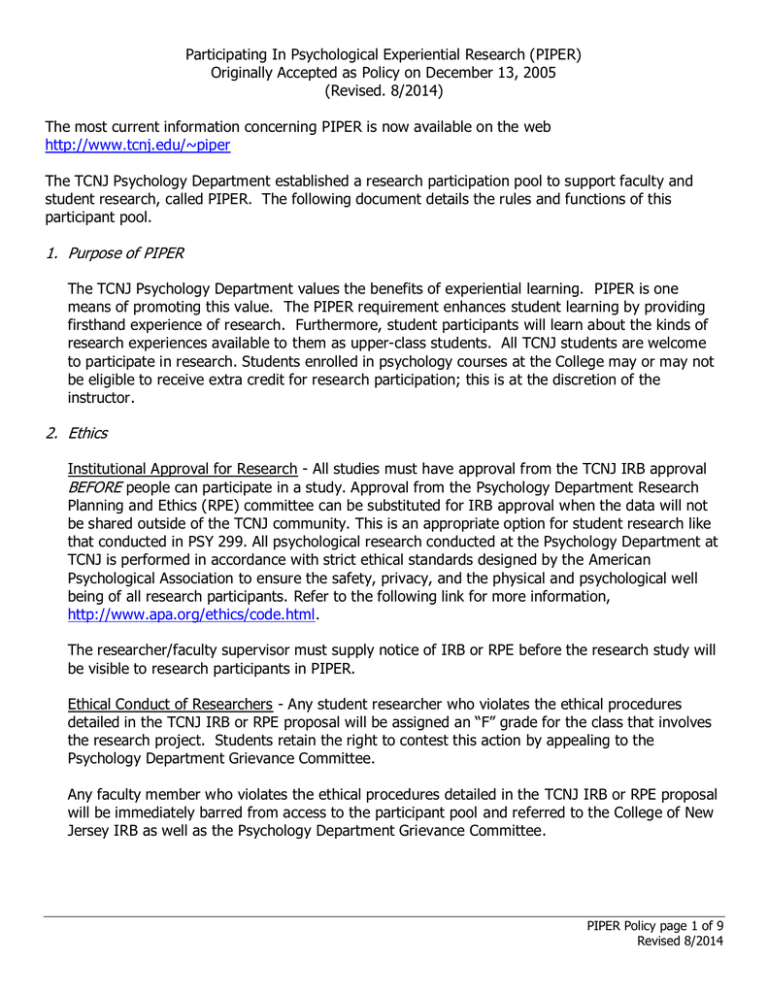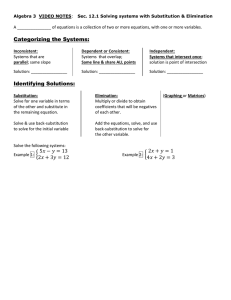PIPER Policy document - Psychology Research at TCNJ: PIPER
advertisement

Participating In Psychological Experiential Research (PIPER) Originally Accepted as Policy on December 13, 2005 (Revised. 8/2014) The most current information concerning PIPER is now available on the web http://www.tcnj.edu/~piper The TCNJ Psychology Department established a research participation pool to support faculty and student research, called PIPER. The following document details the rules and functions of this participant pool. 1. Purpose of PIPER The TCNJ Psychology Department values the benefits of experiential learning. PIPER is one means of promoting this value. The PIPER requirement enhances student learning by providing firsthand experience of research. Furthermore, student participants will learn about the kinds of research experiences available to them as upper-class students. All TCNJ students are welcome to participate in research. Students enrolled in psychology courses at the College may or may not be eligible to receive extra credit for research participation; this is at the discretion of the instructor. 2. Ethics Institutional Approval for Research - All studies must have approval from the TCNJ IRB approval BEFORE people can participate in a study. Approval from the Psychology Department Research Planning and Ethics (RPE) committee can be substituted for IRB approval when the data will not be shared outside of the TCNJ community. This is an appropriate option for student research like that conducted in PSY 299. All psychological research conducted at the Psychology Department at TCNJ is performed in accordance with strict ethical standards designed by the American Psychological Association to ensure the safety, privacy, and the physical and psychological well being of all research participants. Refer to the following link for more information, http://www.apa.org/ethics/code.html. The researcher/faculty supervisor must supply notice of IRB or RPE before the research study will be visible to research participants in PIPER. Ethical Conduct of Researchers - Any student researcher who violates the ethical procedures detailed in the TCNJ IRB or RPE proposal will be assigned an “F” grade for the class that involves the research project. Students retain the right to contest this action by appealing to the Psychology Department Grievance Committee. Any faculty member who violates the ethical procedures detailed in the TCNJ IRB or RPE proposal will be immediately barred from access to the participant pool and referred to the College of New Jersey IRB as well as the Psychology Department Grievance Committee. PIPER Policy page 1 of 9 Revised 8/2014 3. Research Participant (RP) Credit Requirements in PIPER. The Psychology Department has instituted a 10 credit requirement for all sections of PSY101, PSY 121 and PSY 299. In addition, faculty may offer extra credit for research participation with their courses. A student will earn (1) one credit in PIPER for each ½ hour of research participation. Students who are enrolled in more than one course with a PIPER requirement during the same semester only needs to complete the requirement for one of these courses. These students must report to the PIPER coordinator to be exempt from additional PIPER requirements. Any student who is not 18 years of age by October 15 th (Fall semester) or March 15th (Spring semester) is exempt from the PIPER requirement because they cannot provide consent. These students must report to the PIPER coordinator to be granted the exemption. The student may be given a substitute assignment at the discretion of the professor. 4. The Process of Allocating PIPER Credits to Researchers. a. At the beginning of each semester, the PIPER coordinator will survey the faculty to determine how many credits will be needed for faculty research (faculty research is defined as laboratory learning, senior laboratory learning, research roundtable, senior research roundtable, individual study, and Honors Thesis research). As part of this survey, faculty will be asked to provide the number of PIPER credits requested and a short description of the project and goals (Note. goals may include publication, presentation, and/or enhancing student learning, for example). b. The PIPER coordinator will tabulate faculty needs (this information may also be shared with the RPE committee), determine the number of PIPER credits in the pool, project the number of credits to be allocated to each section of PSY 299 (based on demand and pool size), and present these data to the advisory committee. c. If the credit requests from Faculty and PSY 299 courses exceed the projected pool, the advisory committee will assess faculty needs based on the descriptions provided by the researchers and determine the number of credits to be allotted to each faculty member and to each section of PSY 299. The advisory committee will work to ensure equitable assignment of credits across individual researchers (e.g., one researcher may have one large N study, whereas another research may have several small N studies). d. If needed, the PIPER coordinator will inform faculty researchers and PSY 299 professors of the number of PIPER credits that have been allocated by the advisory committee for faculty research before the beginning of the semester. These credit caps will be in effect until the last two weeks of the semester. Any researcher can receive additional credits (of any amount) to support research during the last two weeks of the semester. These requests should be directed to the PIPER coordinator who will then raise the credit cap at the request of the researcher. e. The PIPER coordinator will also retain the credit allotments for each faculty member’s research and for each PSY 299 section. The faculty member will enter the maximum number of credits needed for a particular study when an experiment is created in PIPER. Before a study is displayed on the PIPER system, the PIPER coordinator will verify that the study has RPE approval or TCNJ IRB approval with RPE approval of the PIPER description PIPER Policy page 2 of 9 Revised 8/2014 and title and will verify that the faculty member has not exceeded his or her allotment of credits (the sum of all faculty studies cannot exceed the amount allotted to the faculty member by the advisory committee). After this information has been verified, it will be cleared by the PIPER coordinator and can be displayed on PIPER and opened up for participants. f. The process approving studies to be listed on PIPER will be similar for PSY 299 classes: The student researcher will enter the maximum number of credits needed for a particular study when an experiment is created in PIPER. Before a study is displayed on the PIPER system, the PIPER coordinator will verify that the study has RPE approval or TCNJ IRB approval with RPE approval of the PIPER description and title and will verify that the credits are available for the study (based on the total number of credits assigned to a PSY 299 section). After this information has been verified, it will be cleared by the PIPER coordinator and can be displayed on PIPER and opened up for participants. Professors of PSY 299 are encouraged to communicate to the PIPER coordinator. It will help prevent confusion if PSY 299 professors identify the PIPER studies for their classes and the number of credits to be allocated to each study –particularly if they also have faculty research in PIPER. g. The advisory committee can review allotment of PIPER credits and make any adjustments necessary during the semester to ensure adequate research opportunities for research participants. 5. PIPER Alternative Assignment (for students enrolled in PSY 101, 121, or 299) APA requires an Alternative Assignment to be offered to students who choose not to participate in psychological research (http://www.apa.org/ethics/code/index.aspx). The Alternative Assignment offered by the TCNJ Psychology Department will provide students with an experience comparable to the 10 required PIPER credits for PSY 101 and PSY 121. If a student is enrolled in PSY 299 and would like to complete an alternative assignment, the PSY 299 course instructor should provide the student with an alternative assignment and evaluate these assignments. Students enrolled in PSY 101 or PSY 121 who choose an Alternate Assignment must declare their intention by emailing the PIPER coordinator (piper@tcnj.edu) no later than October 20th (Fall semester) or March 20 th (Spring semester). The PIPER coordinator will provide access to the alternative assignment article collection and provide additional instructions to the student. Once a student declares the Alternative Assignment to satisfy the PIPER requirement in PSY101 or PSY121, s/he is removed from the PIPER pool and blocked from research participation. This means that the student cannot complete PIPER studies for credit during that semester, which includes earning extra credit via research participation in another course in which they are simultaneously enrolled. Students seeking extra credit opportunities in these other courses should see their instructor, who will provide them alternative means of earning extra credit (e.g., coursespecific reaction papers). Note that any credit earned through research participation prior to declaring the alternative assignment and being removed from the pool is retained by the student and can be applied toward any course that accepts extra credit. Alternative extra credit assignments will be scaled to reflect the remaining credit that the student is eligible to earn. PIPER Policy page 3 of 9 Revised 8/2014 The Alternate Assignment: Students will choose one scholarly research article from a designated collection and respond in writing to 10 essay questions. The questions will require students to comprehend and think critically about the article. The article collection will change each semester. Students will submit typed responses to all 10 questions to the PIPER coordinator (via a dropbox in SOCS) ON or BEFORE October 30 th (Fall semester) or March 30th (Spring semester). Responses will be assessed by Psychology faculty (see below). Each question is worth 1 PIPER credit; incomplete or incorrect answers will NOT be given PIPER credits. It is expected that typed responses will be approximately 5-7 pages in length. Scholarly Article Collection Psychology faculty using PIPER for their own research or student research projects in a given semester are required to participate in populating the Alternate Assignment Article Collection in that semester. Faculty PIPER-users will submit to the PIPER Coordinator one copy of one scholarly research article from their research area, accompanied by 10 short-answer questions (assessing comprehension of and critical thought about the article). Articles need to be submitted to the PIPER Coordinator before the researcher can access the PIPER pool for data collection. Articles and questions should be submitted in electronic form. Faculty will read student responses to the research article through the SOCS interface (this will be organized by the PIPER coordinator). Faculty will evaluate the correctness and satisfactory completion of each of the questions. Faculty will notify the PIPER Coordinator on or before November 15 th (Fall semester) or April 15 th (Spring semester) of the number of PIPER credits that have been satisfied by the Alternate Assignment. The PIPER Coordinator will assign credits in PIPER to the student. If a student does not satisfactorily complete the alternative assignment, he or she will be allowed to re-write answers to the questions that were unsatisfactory (the PIPER coordinator will communicate directly with the student in this situation). Students are allowed only ONE re-write attempt. If answers are still unsatisfactory after the revision, then the student must accept the penalty for failure to complete the PIPER requirement or ask the PIPER coordinator to intervene and assess the responses. The final determination that an individual student has completed the PIPER requirement remains with the course instructor. 6. Accessing PIPER online. PIPER has web-based software that allows for online tracking and awarding credits. PIPER can be accessed by going directly to the PIPER link (http://www.tcnj.edu/~piper). Students log into the system using their TCNJ unix account name and password. Students can view research studies in PIPER. In PIPER, students can click a research study name and see eligibility criteria and a short description of the study. They can select the studies that they want to complete by registering for a particular day and time. Study locations are displayed in PIPER as well. Students are sent an email reminder after they sign up for a research study. PIPER Policy page 4 of 9 Revised 8/2014 7. PIPER Rules and Obligations for Participants a. Eligibility for studies - Students are responsible for reading eligibility criteria for a particular study. Credit will not be awarded to participants who do not meet the criteria described in PIPER. Students must be at least 18 in order to give legal consent. Students who are under 18 as of October 15th (Fall semester) or March 15 th (Spring semester) are exempt from PIPER research participation. The student must report to the PIPER coordinator to receive the exemption. The student may be given a substitute assignment at the discretion of the professor. Substitute assignments will be recommended by the Psychology Department faculty. b. Earning Credit - Students earn 1 PIPER credit for each ½ hour of participation. All participants are free to end a research session for any reason. In this case, researchers should award credit for the time the participant spent in the session. The PIPER pool closes on the last day of classes. Credit cannot be awarded after the last day of classes. c. Finding Research Studies – PIPER activity typically peaks around the middle to the end of the semester. Students participating for extra credit are prevented from participating during the first half of the semester to help those with a PIPER requirement satisfy their obligation. The PIPER coordinator will monitor the number of research studies available each semester. If there are not many research opportunities, then the PIPER pool will not be opened up for extra credit participation and the Psychology Department will take measures to ensure that students who make a “good faith” effort to complete the requirement are not penalized. If there are ample opportunities, then students will be expected to complete the PIPER requirement. Students should plan to complete studies as soon as possible and to monitor the system regularly. Waiting to complete the requirement during the last few weeks of the semester is not recommended. Any student who has significant time demands should complete the alternative assignment. d. Researcher “no show” policy - In the event that a participant shows up for a research appointment and the experimenter does not arrive within 15 minutes of the scheduled start time, the research participant will receive full credit for the study. The research participant should first contact the experimenter and ask for the credit. If the researcher is unresponsive, then the research participant can contact the faculty sponsor of the research (if applicable) or the PIPER coordinator in order to receive credit. e. Cancelling a Research Appointment (Participants) - Participants may cancel a research appointment without penalty in the PIPER system (by dropping the session) up to 24 hours before the appointment time. A participant may cancel a research appointment without penalty up to 1 hour and 20 minutes before the session by emailing the experimenter. f. Cancelling a Research Appointment (Researchers) - Researchers may cancel a research appointment in the PIPER system (by cancelling the session) up to 1 hour and 20 minutes before the appointment time. The researcher should email the participant to provide notification of the cancellation. In the event the researcher does not cancel the session according to these specifications, the participant will receive full credit for the research study. PIPER Policy page 5 of 9 Revised 8/2014 g. Tardiness – Participants are expected to arrive to studies at the scheduled start time. Depending on the nature of the study, researchers may not be able to accommodate participants who do not arrive on time. Unless otherwise stated, researchers may refuse participants who are more than 15 minutes late for an occurrence. Failure to attend on time constitutes a no-show and will result in receiving a strike. h. Strike Policy (Participants) – Participants who fail to attend a research appointment without advance cancellation, deliberately misrepresent their eligibility to participate in a study, or behave in a disruptive or disrespectful manner to researchers will receive a strike in their PIPER account. Participants who have accrued three strikes during a single semester will be banned from research participation and can only complete the PIPER requirement with a compulsory written assignment administered by the PIPER coordinator. Please see section 8 below for more details on strikes. i. Research participants may complete an anonymous evaluation of a PIPER study. These evaluations appear in PIPER after credit has been assigned. j. After participants accumulate PIPER credit, they must apply PIPER credits to a class in order for the faculty member to verify that the student has earned credit (instructions for this task are available on the PIPER information webpage). Participants may apply credit to only ONE psychology class. Participants must apply earned credit to their class before the first day of final exams. Only those students with an unresolved credit dispute will be allowed to apply credit after this date – the PIPER coordinator must be notified of the credit dispute/problem before the first day of exams in order for this exception to apply. k. Students are required to complete the 10 research participation credits, or to complete the Alternative Assignment (item 4). If a student fails to complete the participation requirement or the Alternative Assignment during the semester, then the penalty is onethird of a letter grade deduction (e.g., a B+ grade becomes a B). No incompletes will be offered for failure to complete the PIPER requirement. l. If a student fails to fulfill the piper requirement and he or she wants to contest the failure, he or she must notify the PIPER coordinator within 4 weeks of the end of the semester. This will allow the PIPER coordinator to access the PIPER data that pertains to the student. Failure to notify the PIPER coordinator within this 4 week time frame does not guarantee that the PIPER coordinator will have access to the data that might indicate that the student completed the requirement. 8. Strike Penalties and Practices Effective fall 2012, PIPER transitioned to a strike system to penalize unethical behavior on the part of participants. Participants that fail to attend a research appointment without advance cancellation, deliberately misrepresent their eligibility to participate in a study, or behave in a disruptive or disrespectful manner to researchers will receive a strike in their PIPER account. Researchers are responsible for fully documenting the rationale for applying or removing strikes. PIPER Policy page 6 of 9 Revised 8/2014 Participants will receive an email when their strike count changes; this email contains a running commentary of the rationales for adding or removing each strike during the semester. When a student participant reaches 3 strikes, the PIPER system will prohibit any further research sign-ups. The participant will be directed to contact the PIPER coordinator. It is the responsibility of the student to contact the PIPER coordinator after striking out, otherwise the student will fail the PIPER requirement. At this point, the coordinator will assign the participant a written, Compulsory Assignment that is scaled to reflect the number of PIPER credits that the participant has left to complete. (For example, if a student earned 4 points through research participation prior to striking out, the written assignment will be scaled to include 6 written responses that correspond to the remaining 6 points needed to satisfy the 10-point PIPER requirement.) Students cannot select their Compulsory Assignment, nor are they allowed multiple attempts to correctly answer the questions, unlike the Alternative Assignment that students can volitionally opt to complete instead of research participation (see section 5). Students are responsible for clarifying any questions about the Compulsory Assignment prior to submitting their responses. If any of the submitted answers are unsatisfactory, then the student must accept the penalty for failure to complete the entire PIPER requirement. The Compulsory Assignment is due at the deadline set by the PIPER coordinator. Failure to submit the assignment on time will result in failing the PIPER requirement. Participants have the right to appeal strikes to the PIPER coordinator for review. The coordinator will then investigate with the cooperation of the faculty member who applied the strike. If the strike was applied in error, it will be removed and will no longer count toward the strike total. 9. PIPER Rules and Obligations for Researchers a. Researchers must follow the guidelines described in the TCNJ IRB or RPE proposal (refer to the Psychology Ethics Review document for distinctions between research that can be reviewed by the Psychology Department Ethics Review process and that which must be reviewed by the TCNJ IRB). IRB or RPE approval must be obtained BEFORE data collection can begin. The number of requested credits must fall within the researcher’s allotment of PIPER credits for the semester (see item 3). b. In order to gain access to the PIPER pool, a researcher must first submit a completed Alternative Assignment (refer to section 5 in the PIPER Policy) and a completed Compulsory Assignment (refer to section 8 in the PIPER Policy). The same article and question set cannot be used for both the Alternative and Compulsory Assignments. Students select Alternative Assignments from the pool at will, but are assigned Compulsory Assignments in a rotating fashion by the PIPER coordinator. Any assignment that has been previously completed by a student must be replaced by the researcher with a new assignment in the following semester. c. In order to gain access to the PIPER pool, a researcher must have a status of “good standing” with the PIPER system. Researchers automatically begin their association with the PIPER system in good standing and can maintain this status by following all the rules and requirements of the PIPER policy. The following list is a partial list of activities that are absolutely required to maintain a good standing: PIPER Policy page 7 of 9 Revised 8/2014 i. Researchers must assign credits in a timely manner (within one week of the session date). ii. Researchers must be sensitive and respond in a timely manner to RP concerns. iii. Researchers must maintain positive evaluations on the question “the researcher was professional” and “my participant rights were respected”. The Advisory Committee will determine when a researcher fails to maintain a status of good standing. Any problems that may cause a researcher to fail to remain in good standing must first be addressed to the researcher in writing. The researcher will be given an opportunity to address and/or correct any problems. Losing a positive status in PIPER should be considered a final option when it becomes clear that a researcher cannot consistently follow the rules of PIPER. All problems must be clearly documented by the Advisory Committee. The Grievance Committee may be consulted to arbitrate any disputes between a researcher and the Advisory Committee. d. Researchers must keep a paper list of participants in his or her research study. This list must be kept separate from the data and in a secure place. This list must include: PIPER experiment name, day and time of research appointment, RP name, and the total time in the study. The researcher may elect to add day of appointment and time in the study to the consent form – this would serve as a paper copy of research participation. The purpose of this obligation is to create a way to resolve any credit disputes between the researcher and research participants. e. Researchers must post credits in PIPER within 1 week of an appointment. Repeated violations may result in forfeiture of access to PIPER. f. Researchers are responsible for accurately and professionally documenting the rationale for any strike applied or removed from a student’s account. This information is shared with the student participant and is required by the PIPER coordinator in the event that the student challenges a strike. Further, researchers are responsible for maintaining the confidentiality of the comments contained in participants’ strike records; faculty and research assistants must not disclose this information to others. g. The PIPER pool closes on the last day of classes. Researchers should post all remaining credits before the first day of final exams. h. Researchers must include the PIPER name and description of the study as it will appear on the PIPER system in the RPE proposal. For studies that have TCNJ IRB approval, researchers must have the PIPER name and description of the study as it will appear on the PIPER system approved by the RPE committee. i. Researchers must debrief participants. The online research evaluations may be read by the Graduate coordinator, the PIPER coordinator, and/or the Research Planning and Ethics (RPE) Committee Chairperson. In the event that a research study receives consistently poor evaluations indicating professional ethics breaches, the RPE chairperson may elect to bring the investigator before the Psychology Department Grievance Committee for possible PIPER Policy page 8 of 9 Revised 8/2014 referral to the TCNJ IRB. The Psychology Department recommends that investigators retain evaluations for a period of at least one year. PIPER Policy page 9 of 9 Revised 8/2014



